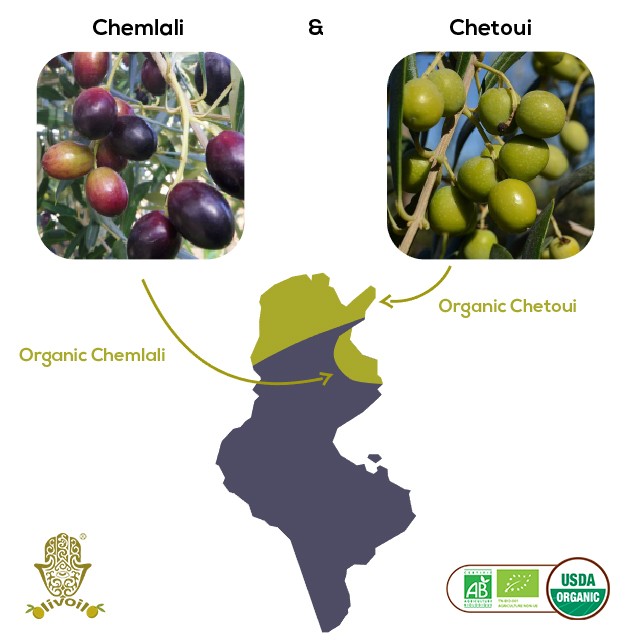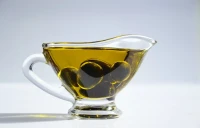WHERE I COME FROM
Discover my origin.CORE OF MEDITERRANEAN REGION
The Sahel is a coastal region of the center Tunisia. It is known for its olive groves, industry of the textile and tourism. It is the most populated area of all Tunisia. Its main cities are called: Sousse, El Jem, Monastir and Mahdia.
OLIVOILO
ORGANIC EXTRA VIRGIN OLIVE OIL

OLIVOILO is produced from olives that have been grown and harvested in an organic manner. The growing, harvesting, manufacturing and packaging has been reviewed by an accredited organic certifying agency, and they document that every step in the process has been up to par.
This oil meets all tested IOC standards for Organic Extra Virgin Olive Oil.


In the mid-quaternary, the oleatser, a wild olive tree with very small flavorsome fruits, grew everywhere on the Tunisian soil. In the 8th C, the Phoenicians grafted it, nurtured it, and pressed its fruit to obtain the oil.
Tunisian olive oil, pure and deep rooted, tells the region’s history with a golden fluidity. known to be ingenious and ahead of their time, Phoenicians took the olive fruit as a model to create an earthen jar used to store and later to ship the precious oil. Potters shaping the clay by hand with their wheels, made these jars long and hollow, with handles and a support which made the new recipient manipulation easier.
TUNISIA
Africa’s Biggest Organic Food Exporter
Liquid Gold : Olive Oil The Tunisian way
Tunisian Organic olive oil is a high quality product certified by recognized international organizations that verify the compliance and application of the ORGANIC regulation during the production process.
Depending on the target market, the producer asks the certifying bodies to certify its olive oil according to the regulations in force.
In addition to green, animal or mineral manures, and organic products, the use of certain fertilizers such as compost is permitted.
Pest control is carried out under biological control in accordance with authorized products and appropriate agricultural practices. Chemical and synthetic fertilizers and pesticides are prohibited.

One of the largest olive oil producer with a Premium quality approved
In Tunisia, 40% of the cultivated areas according to the organic mode are allocated to olive plantations providing an average production of 19000 Tons over the last 4 years. This production allowed an export volume oscillating between 9,000 and 14,000 Tons of organic oil destined to the United States of America, Italy, France, Japan, the United Kingdom, Canada, Malaysia and the United Arab Emirates.
” The mighty olive tree seems to always offer a sign of hope. And in the case of Tunisia it has offered not only hope but a form of national pride. “
MY HISTORY

Historically, Tunisian Olive Oil has been a hidden treasure. It has been exported to more well-known olive oil producing countries and bottled under many recognizable brands. Today, consumers around the world can enjoy “a taste of Tunisia’s Liquid Gold!” Nowadays the olive oil is bottled, labeled and shipped with pride directly from Tunisia. Olive cultivation and olive oil production play a vital role in the social and economic life of Tunisia.
Although this country that has had its share of political turmoil lately, I found all this positive press about their thriving olive oil production to be very intriguing.



TRADITIONAL HARVEST

The story of Tunisia and its ancient cultivation of the olive tree is left out of the picture. Indeed, Tunisia’s history of olive cultivation is ancient.
It is a vivid portrayal of farming families in an olive orchard at the start of a new harvest.
It’s a complete scene: A woman in the foreground uses a thresher to separate out olive leaves, twigs and dirt. Nearby, tea is brewing on a smoldering fire next to a man wearing a traditional Tunisian hat, the deep red beret-like chechia, while his wife, her head covered in simple headscarf, sorts through newly picked olives.
There is much more going on too.
People clamber on ladders in the backdrop, picking olives, and a boy — perhaps the painter himself? — appears enchanted at the center of the work of art. This boy is not lifting a finger, content as he is to muse on the moment of the great harvesting, the continuation of a tradition.
And now, you can see this in every region of Tunisia. We work like this, with children, with women, with wives, with all of the family..
TUNISIAN OLIVE VARIETIES





